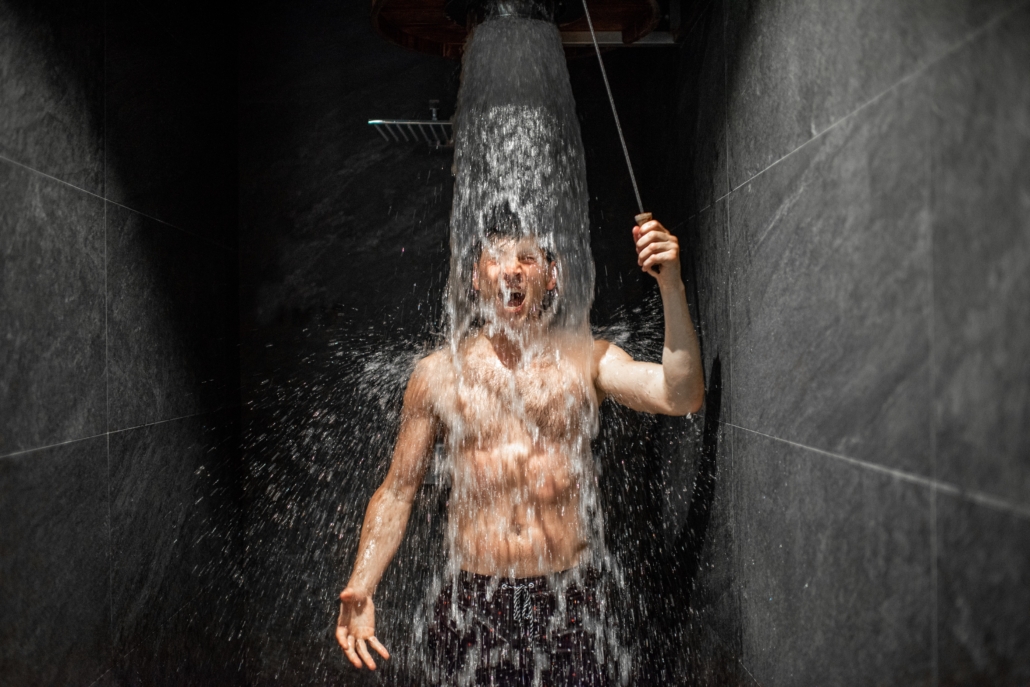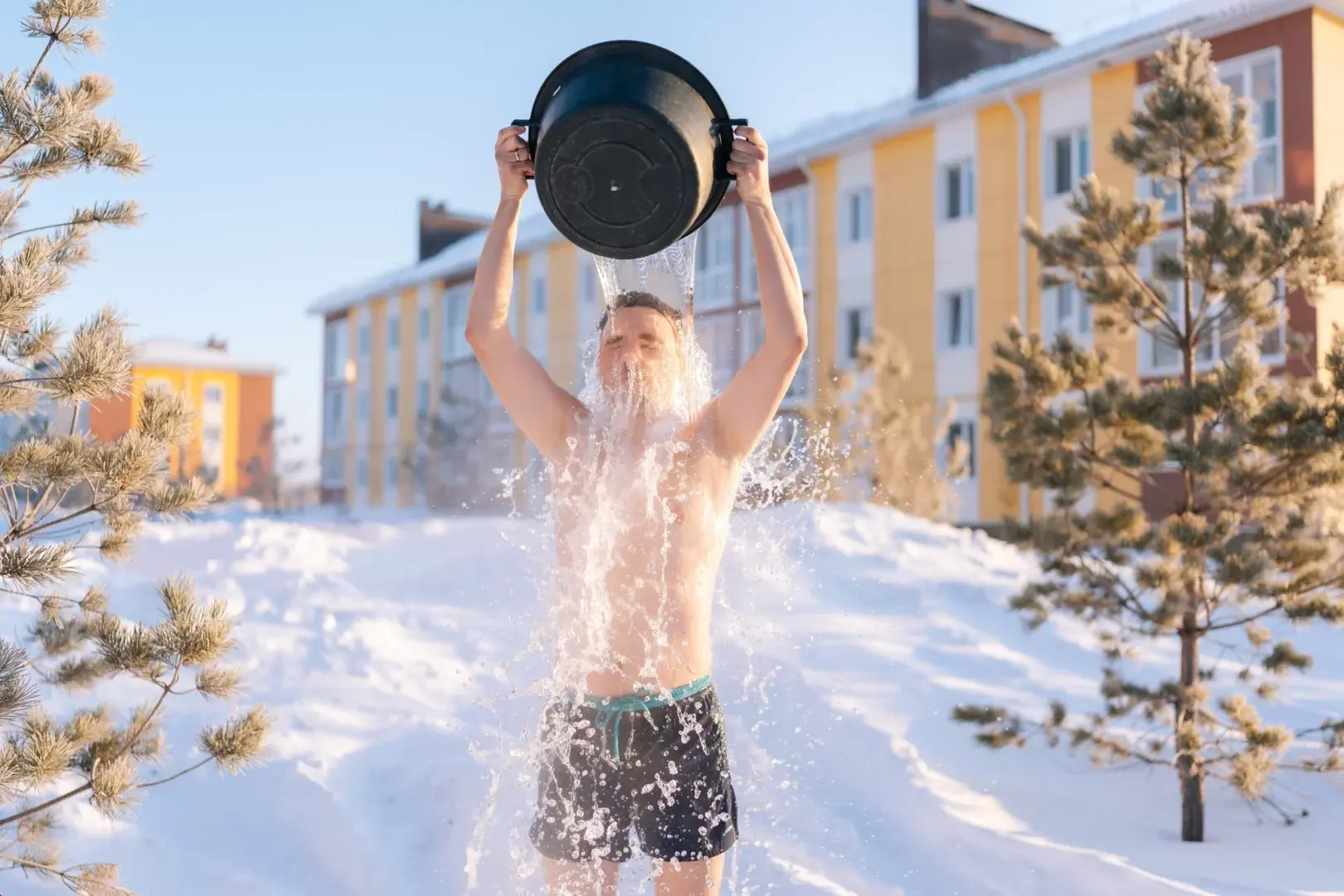Cold showers: Is all that icy pain worth it?
Some people swear that cold showers can deliver myriad health benefits, from keeping chronic disease at bay to clearer thinking, improved circulation and general wellness improvements. But what does the science have to say about them?
Cold showers: Are they worth the pain?
NOTE: This article refers to cold water exposure. If you are currently experiencing any medical issues, we recommend you speak to your physician before attempting.
Early in September last year, I found myself standing on a beach in County Mayo in the west of Ireland. The air temperature was about 18°C (64°F), which is a little too chilly for the pair of swimming shorts I was wearing. I was being told by my other half’s parents (also wearing swimming gear) that “you get used to the cold quite quickly!”. We were going for a swim. The water temperature was about 15°C (59°F) – so much for a summer’s worth of warming up!
As a physiologist, I know we lose body temperature much more quickly in water than air of the same temperature. Was I excited for what awaited me? No. Was I feeling peer-pressured and at risk of being shown up? You bet!
So, in we got. They do this every day, and marched in as if they were striding into a luxury spa. I tried my best to keep pace but it was tough, especially as certain body parts became submerged. What then followed was a satisfaction curve that followed somewhat of an arc, with a flat top. Ten minutes of hyperventilating and questioning my life choices, 10 minutes of enjoyment coupled with ‘oh, it’s actually quite nice!’ and 10 minutes coming back down the arc as I felt the life being sapped from me. When we got out and (finally) warmed up, there was general agreement that it was in fact enjoyable.
I subsequently went in each day I was there, and it did indeed get easier. But it was after the first dip when someone said: “I’m sure it’s supposed to be really good for you … isn’t it?!”. There was talk of all sorts of miracle cures following these cold plunges, from keeping chronic disease at bay to clearer thinking, improved circulation and general wellness improvements. Also, there was a talk of a mystery man named Wim Hof.
So, is there any basis for these claims and who is this fella they call the Ice Man? Let’s find out.

Are cold showers good for you?
This article will consider the purported claims of cold water exposure and also how these statements stack up against the scientific literature.
But before we get to that, let’s back up a bit. You may have heard of colleagues, friends or loved ones telling you how they’ve started to kick their day off with a freezing cold shower in the morning and they “feel great” for it. But how has this crept into the public consciousness? In part, it is likely through one of its top advocates Wim Hof, the Ice Man. Hof is described as a Dutch extreme athlete who is noted for his ability to withstand freezing temperatures. He holds, or has held, a number of world records including being embedded in ice for nearly two hours.
Hof states his ability to achieve such feats stems from a combination of breathing technique work (which he likens to controlled hyperventilation), the cold exposure itself (which he recommends you work up to gradually) and meditation (which he does while doing both the breathing exercises and the cold exposure).
We have Hof to thank for this upsurge in this kind of practice, with many Hollywood A-listers citing use of his techniques. This has further driven up interest and participation across all walks of life. You can find his particular method easily online, but we are going to focus mainly on the cold water immersion.
The supposed benefits of cold water immersion are numerous. Physiologically they include:
The psychological benefits are also numerous and include:
It is also worth mentioning that such practice is not without risk to some individuals. Cold water immersion has been found to sometimes make stiff muscles worse, reduce the impact of some training types and also (unsurprisingly perhaps!) increase the risk of hypothermia.
But if even half of the positive claims were true, then it’s safe to say we would all have something to gain from factoring cold water immersion into our lives. However, this is a long, and at times woolly, list (I actually removed a fair few from my original list as they were even woollier!).
But let’s be honest – this is not a particularly pleasurable experience, certainly at first anyway. So, let’s see what evidence is out there to back up what, for many, is likely a pretty uncomfortable lifestyle change.
The cold, hard facts on cold showers
Relatively, there is quite a lot of specific research out there on what is quite a niche topic. A lot of this centres around Hof himself, who has participated in a lot of the research that is referred to below.
MRI scans of Hof’s brain found that when he is carrying out his breathing technique, he is able in a sense to trick his brain into producing a chemical that puts him into a euphoric state at a time when the rest of us would be feeling intense discomfort. The pain we would typically feel is important, as from an evolutionary sense, it lets us know when a situation is undesirable. Subsequently, this lets us know that we should remove ourselves from it – this is certainly how I felt as the water became waist deep in Ireland!
Our bodies, though, can override this, again for evolutionary reasons. For example, let’s imagine you’re being chased by a gorilla 10 seconds after standing on a nail that goes right through your foot. Normally, the nail would be extremely painful. In this circumstance though, your brain knows it can worry about your foot later – if you’re able to outrun the gorilla! It seems as though Hof’s breathing technique enables him also to override his pain response, without the need for the ape!
So, is it actually the breathing that is leading to the reduced pain and improved psychological state rather than the water itself? Well, it is argued this initial consequence will only help you for the first couple of minutes in the water. As a result of more prolonged exposure, opioids, serotonin, and dopamine (all of our happy chemicals) kick in, a kind of self-fulfilling positive cycle. These chemicals, it seems, are your reward for getting through that initial pain barrier. They then aid your ability to tolerate longer exposure and potentially bring about some of these further benefits.
But what about some of these other benefits that are claimed? Are they too good to be true?
The changes in the brain referred to above not only seem to allow for greater ability to tolerate the cold but also provide additional chemical responses. This is achieved via what has been described as a controlled stress response characterised by activating the sympathetic nervous system. This appears to reduce the innate immune response and, in turn, leads to reduced inflammation which has subsequently been found in more in-depth research also. Though links are yet to be specifically made, this could lead to many positives linked to some of the physical benefits listed above, from enhanced recovery to reduced likelihood of some disease occurrences.
This manipulation of the body’s immune response could also influence the way the body responds to pathogens such as bacteria and viruses. This was trialled with a group who were trained in Hof’s methods and were found to be able to voluntarily activate their immune response and subsequently showed fewer flu-like symptoms.
The chemical response mentioned above is likely the primary reason for the pleasure experienced by many following their cold showers, alongside serotonin and dopamine chemicals, including adrenaline which have also been found to be ramped up after undertaking Hof’s methods. This cocktail would combine to give effects similar to that felt when on a rollercoaster.
Beyond such acute euphoric benefits listed above are also a handful of specific chronic medical conditions. At this time, it seems evidence to substantiate such claims is often unspecific, and it is suggestions based on broader evidence that triggers them. That is not to say they are untrue, and often in science the research can take time to filter through.
Arthritis is one such condition where this is the case. Linking back to the potential to reduce inflammation in someone practicing these techniques, healthy individuals have been found to be able to reduce chronic inflammation using Hof’s methods. This has prompted researchers to suggest that this proof of concept investigation should now be rolled out further to include diseased populations. This is similar for many other chronic illnesses linked to the above proposed benefits.
Is it time to take the plunge?
Perhaps unsurprisingly, it seems Hof’s success in tolerating extreme cold, and the subsequent benefits it might yield, are driven by training the brain rather than specifically the body. Further investigation into whether his tolerance was a result of the brain or body indeed found that control of the brain may be more possible than first realised and that this may lead to many possible positive outcomes.
This leaves some interesting and exciting proposals that we may genuinely be capable of far more than we think if we can safely train our brain over time to deal with such environments. It seems this may then allow us to reap some of the benefits that may in time be shown to be associated with such mind over matter challenges.
Cold showers: Take-home points
Wim Hof is likely the Usain Bolt of the extreme cold temperature world. Can you expect to build superpowers on the same level as his to be able to withstand such extreme extremes? It’s unlikely. Can you train yourself to be better able to tolerate a cold shower in the morning? That seems a little more likely. And will it live up to every claim? Well, probably not. The science certainly isn’t backing them all up just yet. But that’s not to say evidence won’t be gathered over time as further research is conducted.
It’s also useful to keep in mind that some people will absolutely hate to implement these kinds of techniques. To those, I say you shouldn’t be worried if that’s how you feel as you read this. A lot of the psychological and potentially physical benefits associated with the Wim Hof method can be achieved via other mindfulness techniques such as meditation.
It does seem though, that if you’re able to get through the initial period of discomfort, there likely are some benefits for both the body and mind for the breathing technique, cold water immersion and meditation of the Wim Hof method.
My next trip to Ireland is planned for some time just after Christmas, so I’ve plenty of time to prepare. I’ve just looked, and the water temperatures should be down to 10°C (50°F) by then though. Maybe just a shortie wetsuit?
[optin-monster slug=”nhpxak0baeqvjdeila6a”]



